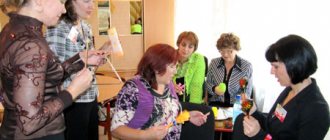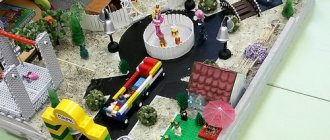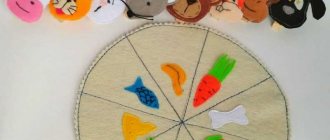MAGAZINE Preschooler.RF
“Creating play motivation at different age stages”The topics of OOD, its purpose and course involve a creative approach. I try to use as many means as possible to make educational activities interesting, educational and educational in nature! Children are very affectionate, trusting, and inquisitive. Each activity opens up something new for them, which then becomes their own, familiar, understandable, and close to them. They do not like monotony, they cannot listen for a long time, or sit quietly. They love to play. That's why I include games during the learning process. During OOD we play serious and smart games. But we play not for the sake of playing, but in order to awaken in all children the spark of inquisitiveness and curiosity. People come to us and we invite famous heroes of children's fairy tales, cartoons, cheerful and funny people to visit us. They ask children “tricky” questions, bring letters with requests, tasks, puzzles, etc.
Someone went to visit children, to those who correctly explained the route from kindergarten to their home.
Why always came with difficult questions. He himself is very literate and knows a lot. He is upset if few of the children can answer his questions. After all, something interesting and mysterious is remembered for a long time.
The children loved it when Pinocchio appeared in class and loved correcting his mistakes. Dunno was also interesting to them.
This is how I taught my children a lot using elements of play. Their mental stress and fatigue disappeared. They quickly and eagerly completed all tasks.
So, a serious, purposeful game helped to consolidate the children’s knowledge, summarize the lesson, and relieve mental stress.
Playing in preschool is one of the favorite activities.
Therefore, the game method occupies an important place in the education of preschoolers. Creating game situations allows you to attract the involuntary attention of children. In a game setting, it is easier for a teacher to activate children’s attention, keep it focused on the proposed content, and develop interest in working in a group environment.
The opportunity to develop creative abilities in preschoolers through play attracts the teacher’s attention to this type of children’s activity and allows him to use gaming techniques in the classroom.
When conducting games, children’s knowledge and interest are taken into account, to know and take into account the children’s gaming experience, to imagine what specific tasks are solved during educational activities when using one or another gaming technique.
The game is offered by the teacher, and this is how it differs from free play. The game should feel like a real game. One of the signs of a gaming technique is a gaming task - determining the goal of upcoming gaming actions by the teacher or children.
Age-appropriate play provides children with incomparable joy and allows adults to effectively guide their actions.
To arouse and maintain children’s interest in activities aimed at mastering basic knowledge and skills and developing cognitive activity, gaming techniques are widely used. Often the entire lesson is conducted in the form of a game.
- Tell the children that something happened to some game characters. As a result, they urgently need those objects that can be sculpted, drawn, built, etc. The characters themselves cannot do this, but they have heard that in this group there are very kind and skillful children who will help them.
- Ask the children if they agree to help (wait for an answer - consent).
- Invite the children to teach them how to do this very well (also wait for an answer - consent).
- During work, each child should have his own ward toy character, who is nearby and rejoices along the way, expresses his wishes, etc.
- These toys are also used by the teacher to evaluate the children’s work, which is given on behalf of the toys, as if from their position.
- At the end of the work, children must be given the opportunity to play with their charges, using the resulting product if desired.
It is advisable that the teacher’s stories should mostly feature the same characters. Then the children will love them and acquire a lasting interest in their lives and the events that happen to them.
The children's favorite was the bear cub Misha, a puppet theater character. He knows how to talk, pat the most distinguished people on the head, shake his head and feel sorry if something didn’t work out for someone or someone is upset about something. Misha congratulated the children on their birthday. He looked into children's works and “whispered” words of approval. Sometimes he would get angry with someone and go back into the forest. The forest is quiet, no one makes noise or bothers him. The children were interested in him and tried not to offend him so that he would not leave. They believe that Misha, like them, can think, get angry, and be happy. After all, children have no boundaries between the real and the imaginary.
The need to create play motivation continues in the older group of preschool age.
Game techniques are used to arouse preschoolers’ interest in the proposed tasks.
Already on the new program content, solving new educational tasks, the teacher continues to present children with tasks that are difficult for them in a playful form, introducing motives that encourage preschoolers to do their work efficiently.
The preparatory group also uses game-based teaching techniques, but their share is significantly reduced, giving way to other techniques that allow children to form a conscious attitude towards the learning task.
In the senior, preparatory group, it is advisable not to include didactic games, but to unite them with a single theme, plot. For example: travel (to the forest, circus, space, etc.).
Game forms of OOD: performance, fairy tale, meeting, etc.
Every time we prepare for OOD, we repeatedly find it difficult. How to start? Why? To make it interesting for children. Our children love to travel, so I spend OOD in the form of travel.
I travel on a variety of occasions:
"To the land of fairy tales".
"To the Land of Curiosities".
"To Fantasy Island".
“A trip to the Arts Square , where we will get acquainted with architectural monuments.”
"Space flight on a rocket" . Etc.
Let me give you an example (construction).
— Guys, are you ready for our next trip?
- Check if you took everything with you? Did you remember to take your imagination, invention, and good mood with you on the journey?
Before we map out the route for today's journey, listen to a story.
One day in a museum they accidentally discovered an old envelope that had fallen behind a shelf. Its edges were very frayed. The appearance of the mysterious envelope indicated that he had experienced a lot in his lifetime. The envelope attracted the attention of museum workers, and they immediately opened it. There lay a scrap of a letter, yellowed with age. In all likelihood, it belonged to some traveler. This envelope is with me now. Let's read it.
“On the map I depicted the location of the island, but, unfortunately, I cannot convey to you the beauty of its castles, palaces, towers, which was told to me by a person who visited this island and took part in its development. He also noted that all the structures were erected from rectangular, square and triangular blocks of various sizes.
It’s a shame that this fabulously beautiful island no longer exists.”
— Guys, what do you think was written next, what did the traveler dream about? (The traveler dreamed of restoring these marvelously beautiful buildings).
So, we will go to Stroiteley , where we will have to prepare construction details and plan the structures.
Let me give you an example of a mathematical train journey.
— Now you and I will go on a mathematical journey, where we will solve problems, examples, and count. We will learn ourselves and teach others.
Our train is unusual - mathematical. (I display a train and several trailers.)
And our familiar little engine brought us interesting tasks.
(Then the children complete tasks: for example: name the geometric shapes that make up the train and trailers, count how many trailers, etc.)
You can start OOD with a surprise moment (someone sent a telegram, a meeting with a literary hero, a letter of invitation, a meeting with various animals, dolls).
OOD can be started by listening to a piece of music, by asking riddles, by making up a fairy tale, by having a conversation, by reading an excerpt from a poem, by reading an invitation card, by viewing a painting, etc.
When conducting OD on FEMP, when becoming familiar with the concept of “order,” you can use this method.
When studying the concept of “order,” it is useful to arrange children in accordance with some order: by height, by age, by number order, etc. You can count various objects forward and backward. For example: based on the pictures, suggest questions and tasks: (pictures: boy, fish, cat, hare, butterfly, wolf, chicken, bird, moth, bee).
- Count everyone in order (the first is the boy, the second is the fish, etc.).
- How much is a bunny worth? Wolf?
- Who is located next to the butterfly? In front of her? After her?
- What is the kitten's value from the end?
Children really like this game to develop attention: they close their eyes, and the teacher changes the order of objects or removes some object. We need to restore order.
According to FEMP. "Exploring the number 7 and the composition of 7" .
The number is illustrated on a number line as the result of adding 1 to the number 6. The composition of the number 7 is shown.
The number 7 played a large role in ancient mythology (7 Roman gods, seven wonders of the world in Ancient Greece, etc.) and retained this role in literature. They remember the 7 dwarves from the fairy tale about “Snow White and the 7 Dwarfs” , you can read an excerpt from the fairy tale by A. S. Pushkin “About the Dead Princess and the 7 Bogatyrs” . Everyone knows the proverbs and sayings in which the word “seven” : “Seven do not wait for one” , “Measure seven times - cut once” , “Seven troubles - one answer” , “One with a bipod - seven with a spoon”, etc. In these proverbs and sayings, the word “seven” acts as the word “many” . You can remember that we use a seven-day week, we talk about the seven colors of the rainbow.
I consider motivation to be mandatory and one of the main elements in the upbringing and education of preschoolers. Otherwise, we risk ruining our children's childhood. Whatever preschoolers do within the walls of our kindergarten, they must do it with interest, so that their eyes light up, so that the children enjoy communicating with us. Otherwise it will be hard work. We will develop the child’s head, but his soul will suffer.
| Next > |
Development of play motivation in preschoolers
The most important aspects of the individual’s psyche develop in the game. It is thanks to her that the main ethical principles stand out in the mind, and also the formation of cognitive activity in preschoolers occurs. The main desire of any child is to become like an adult. In early childhood, the child is not yet able to fully control his desires. It is his desires that guide him. This feature gives parents and teachers multiple opportunities to motivate and guide his hobbies and aspirations.
The development of motivation in preschoolers should not be a stage that precedes learning. These two processes must occur in parallel. Educational activities at an early age must be organized so that they are varied, exciting, and also provide the opportunity to fantasize.
Preparing younger preschoolers for school
Preschool childhood is the main period of a child’s formation, the development of his skills and abilities. At this time, you need to teach your child to love himself, his friends and family, to be friendly and kind, and to treat others with respect. In addition, the child must retain his innate thirst for knowledge. If in the first 3-4 years of his life he learns to assimilate new information, concentrate, analyze and draw conclusions, then his readiness for school can be considered satisfactory.
Play is not only about joy and entertainment. With its help, you can develop memory, thinking, attention, imagination and other qualities that are necessary for studying at school. While playing, children acquire new knowledge without even realizing it. Psychologists call games the school of life. They facilitate the process of forming ideas about the world around us and assimilating information.
The main aspects of preparing a child for success in school are psychological, emotional and intellectual readiness. Play is an active form of learning. It has two directions at the same time: educational and entertaining. Cognitive motivation of preschoolers is excellently developed by role-playing games. This is an indispensable tool for the full development of a child.
During games with entertaining material, preschoolers master the ability to independently search for a solution to a problem. The teacher equips children only with a diagram and the basics of analyzing the problem. Such games actively contribute to the development of intelligence, design abilities, logic, and spatial imagination. The motivational sphere of a preschooler is extremely flexible; it can be easily adjusted with the help of interesting exercises. Praise from elders for success is a reward for which children will willingly agree to try new activities.
Games should cover all areas. Stimulating the physical activity of preschool children is no less important than working on their emotional or intellectual development. Recently, the demands that schools place on primary school students have increased. Without strong motivation, a child will not be able to cope with either the standard curriculum or the alternative one. Therefore, only comprehensive preparation can make a future student competitive.
The systematic nature of classes has a great influence on the development of the motivational sphere of a preschooler. If parents and teachers, for one reason or another, cannot regularly conduct classes with a child, he loses the ability to solve complex problems, since his analytical skills are deprived of constant practice.



